Introducing the Second Edition of When Sky & Sea Were Not Named
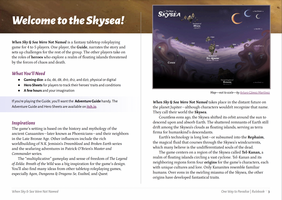
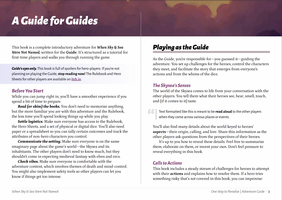
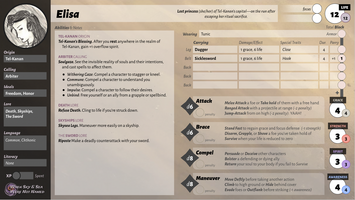
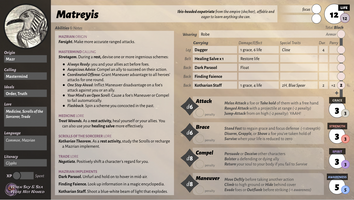
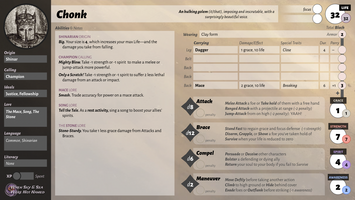
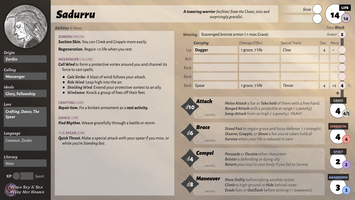
One Way to Paradise is a new adventure for the upcoming second edition of When Sky & Sea Were Not Named. You can find the first edition here on itch.io, which I released almost a year and a half ago. Since then, I've playtested a bunch of possible changes and heard from several folks who ran the system on their own.
In the end, I decided to make some pretty far-reaching revisions to the core mechanics, which I hope will streamline the game and make it easier to play. This adventure introduces those new mechanics—the "second edition"—over a broad slice of gameplay.
What's Changing in 2E?
You can see the changes clearly by comparing the hero sheets. Old above, new below:
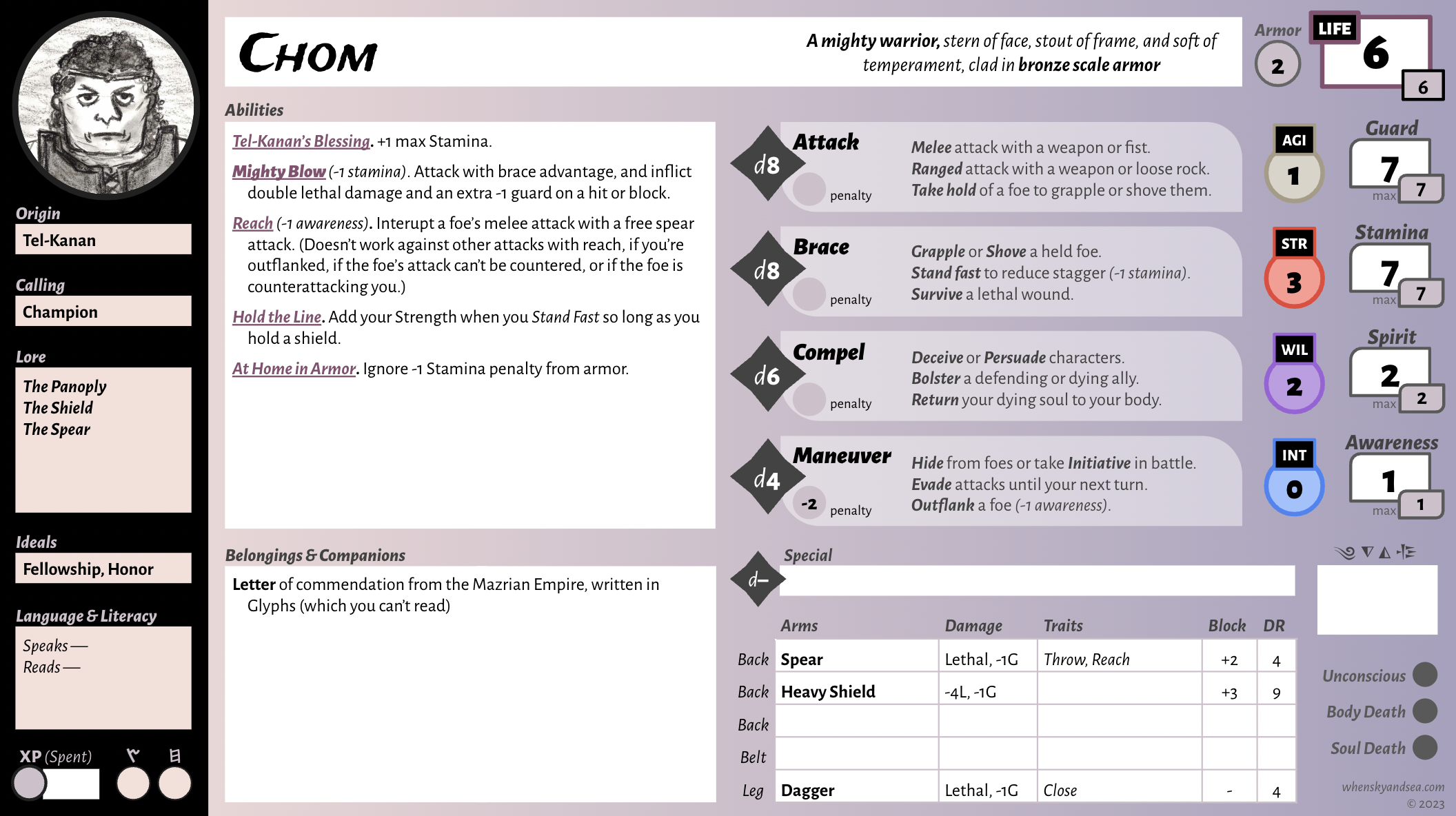
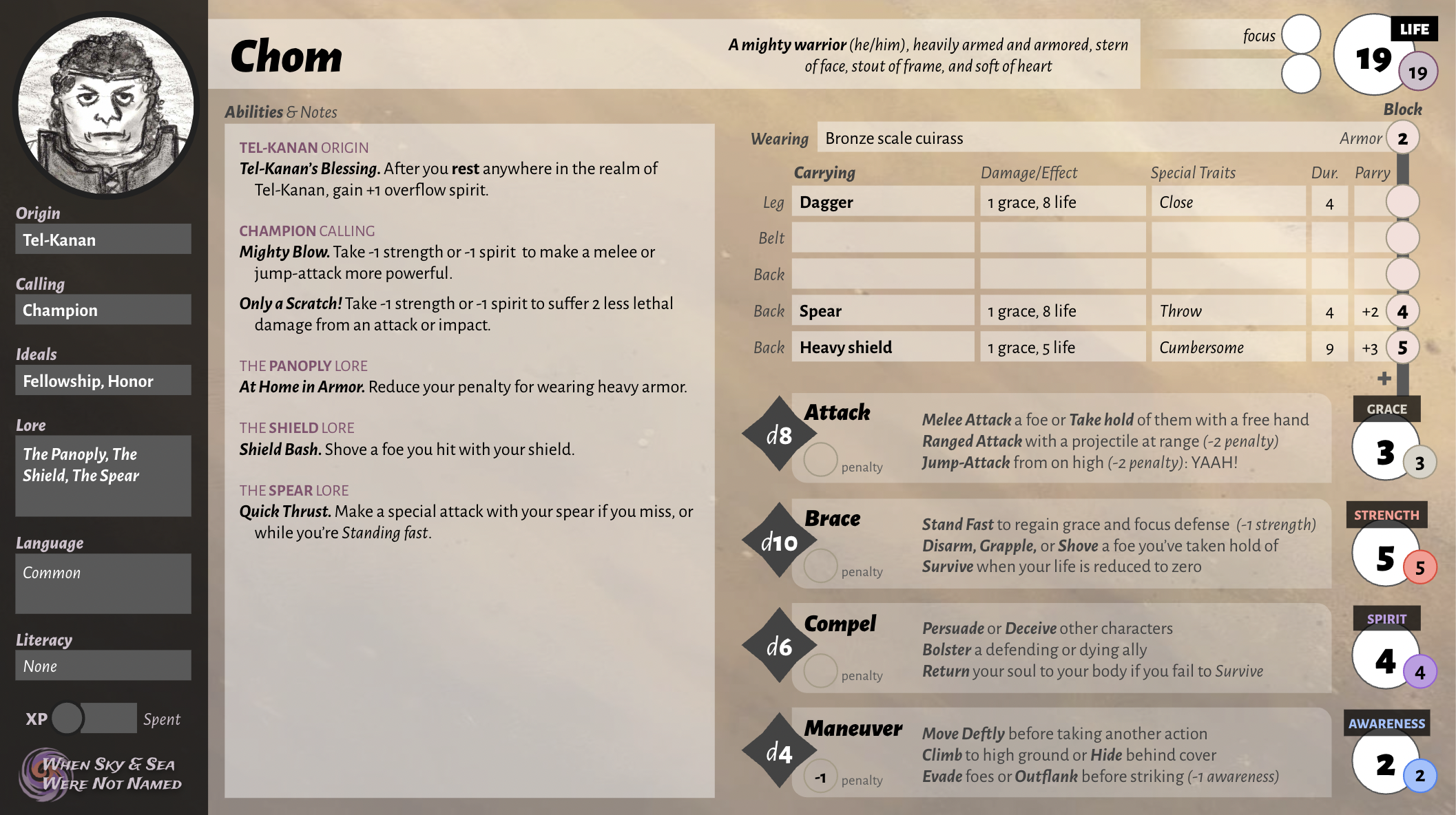
Beyond cosmetic updates, you'll notice:
- The four defenses—Guard, Stamina, Spirit, and Awareness—are no longer in the game.
- The four attributes now work more like the old defenses, with current values that can be worn down by foes or expended to empower your actions.
- The attributes have been renamed and reimagined:
- Agility is now Grace
- Strength is still Strength
- Will is now Spirit
- Intellect is now Awareness
- Attributes scores have increased, ranging from 2–5 for starting heroes instead of 0–3. A score of 3 is now average.
- Instead of a "Guard" defense that gets worn down, heroes now have static defensive values called "Block," based on their equipment. This value gets added to your hero's grace—which does get worn down—as a buffer.
- Attacks now inflict a static amount of damage to grace and, on a lethal hit, to life.
- The life damage scales with the attacker’s Strength; edged weapons like spears inflict Strength + 3 life damage.
- Chom (and everyone) has a lot more Life. Your max Life now equals your [Strength x Size] + Spirit. (Humans like Chom are Size 3.)
- “Focus” is now a general term for many kinds of magical and non-magical resources that require concentration. Many actions generate focus. There are specific kinds of focus—for example, dark-focus, defense-focus—and you can have two kinds of focus at a time.
One big change not obvious from the hero sheet: actions no longer have a partial “struggle” outcome in between success and failure. They simply succeed or fail. (Attacks are an exception—they still have three outcomes: lethal hit, blocked hit, and miss.)
Many individual actions and abilities have changed, too. For example, Tel-Kanan's Blessing no longer grants +1 Stamina, since Stamina no longer exists as a stat. Other actions have been reimagined to work with the new focus system—in particular the defensive actions Stand Fast and Evade. And I've also updated many abilities opportunistically based on feedback or playtesting vibes.
There are too many changes like this to list, so if you've played the game before, please take a look at actions and abilities you're used to—there's a good chance they're slightly different now!
What's next for WSSWNN?
My priority is updating the full core Rulebook with the 2E rules. Many of the 1E abilities and items simply won't work with the new rules and need to be rewritten or replaced. But I'm not starting from scratch: the One Way to Paradise Rulebook has all the basic mechanics for 2E, plus starting abilities for all 4 origins, 4 of the 6 callings, 14 of the 40 lore types, and a good chunk of the items from the original game.
I'm also planning on simplifying the lore system. Learning lore won't require an attribute minimum, and lore won't be categorized by attribute. This change will go hand-in-hand with simplifying the Downtime rules, during which players can learn new lore and embark on projects. I think the lore system is essential to this game, and one of my goals has always been incentivizing players to learn lore from NPCs they meet. You can see some of my ideas for what this looks like in the One Way to Paradise adventure; the final Rulebook will have a lot more details and guidance.
I'm hoping to finish the 2E core Rulebook next year, accounting for playtesting the new rules. I realize that's a long time, so I'm planning on offering work-in-progress drafts of the full Rulebook if folks would like to playtest the new material independently.
After that, I'd love to focus all my energy on publishing new adventures! I've got a bunch of them in the works—they'll include specialized mechanics, like running skyship battles and traveling below the Sea of Clouds. I'd also like to release the core Rulebook as a print volume.
Why change the game?
I've always wanted the game to be relatively fast and streamlined to learn and play. It's not a rules-light game by any means, but my goal has been for the game to feel a bit less complex than D&D 5E.
I don't think the first edition achieved that goal. The three-outcome structure, while elegantly implemented in Powered by the Apocalypse games, feels slow and cumbersome in WSSWNN because (unlike in PbtA) the thresholds for success, partial, and failure are variable and often require back-and-forth between players to resolve.
Also, combat required an ungodly amount of subtraction. I thought it would be faster than D&D because there aren't separate damage rolls. But every successful attack requires subtracting one or two quantities from the result. One of those quantities (Guard) is variable and also gets reduced from attacks along with Life, so there's an order of operations to consider. The math is not hard—but having to do this almost every attack, especially as the Guide, builds up annoyance and stress.
Getting rid of Defenses, changing most actions to a two-outcome structure (instead of three), and implementing static damage (instead of damage calculated via subtraction) removes a lot of complexity from the game and—I hope—makes it a lot easier and faster to play.
That said, some changes add complexity to the game and expand the tactical gameplay, particularly the new focus system and the way the Stand Fast and Evade defensive actions work with it. I'm also excited that the new rules has allowed me to rebalance the fundamental attributes in a way that makes Strength more valuable and Grace (formerly Agility) less like the inevitable god-stat it usually is. Because lethal damage now scales with Strength, a giant creature now hits for massive damage, even if their attack is not particularly accurate, which feels right but wasn't the case in the first edition.
I think the key mechanical concept in WSSWNN, the thing that sets it apart from other games, are the dynamic stats—formerly known as defenses, now just attributes. Your Awareness, for example, isn't just a modifier to rolls, it's a defense against getting ambushed or outflanked—and crucially, this defense gets lower and lower as you focus on your own tactics or magic or get distracted by foes. For me, this give-and-take, risk-vs.-reward is the core "fun" of WSSWNN gameplay, and it's just as present if not more in the second edition.
What's happening to the first edition?
You can still find the first edition on itch.io and on the game's website. Once I rewrite all the core rules to work with the 2E mechanics—again, probably not until later next year—I'll update the assets on itch.io and the website rules to the 2E version. So if you're dedicated to the first edition, you'll eventually need to rely on the 1E PDFs.
In the meantime, if you play One Way to Paradise or have any thoughts or concerns about the transition from 1E to 2E, please comment here, use the feedback form at the end of the adventure's PDFs, or just holler at me on Discord. I'd love to hear from you!
May the winds of fortune be always at your back,
—Daniel
Files
Get One Way to Paradise
One Way to Paradise
A ready-to-play Skysea adventure
| Status | In development |
| Category | Physical game |
| Author | A Purple Person |
| Genre | Adventure |
| Tags | ancient, bronze-age, mythology, No AI, One-shot, quickstart, Tabletop, Tabletop role-playing game, zelda |

Leave a comment
Log in with itch.io to leave a comment.